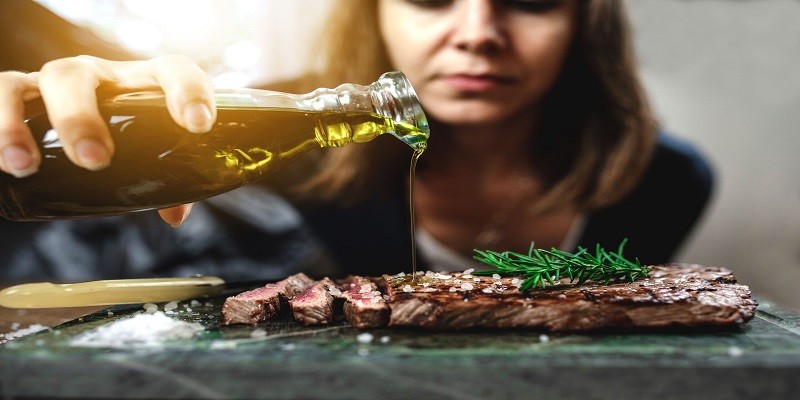Last Updated on January 15, 2025
Yes, pregnant women can eat medium rare steak if it is cooked to the proper internal temperature of 145°F. Being pregnant doesn’t mean you have to give up your cravings for a juicy steak.
However, it’s important to take certain precautions when it comes to consuming meat during pregnancy. One concern is the risk of foodborne illnesses like salmonella or E. coli, which can be present in undercooked or raw meat. While it may seem tempting to indulge in a perfectly pink steak, it is crucial to ensure that it is cooked thoroughly to minimize any potential health risks.
We will delve into the safety guidelines for enjoying medium rare steak while pregnant, including the recommended cooking temperature and other important considerations for expectant mothers.
The Safety Of Consuming Medium Rare Steak During Pregnancy
Pregnancy is an exciting and transformative time in a woman’s life, filled with joy and anticipation. However, it is also a time when she needs to be extra cautious about what she eats to ensure the well-being of both herself and her developing baby. One common question that often arises is whether it is safe for pregnant women to indulge in a juicy medium rare steak.
the Risks Associated with Raw or Undercooked Meat
Steak lovers may find it disappointing to learn that consuming raw or undercooked meat, including medium rare steak, during pregnancy can pose certain risks. Raw or undercooked meat carries a higher risk of bacterial infections, such as Salmonella, E. coli, or Listeria, which can be harmful to both the mother and the unborn baby. These bacteria can cause symptoms such as diarrhea, vomiting, and fever, and in severe cases, they may lead to complications like miscarriage, stillbirth, or preterm labor.
Guidelines from Health Authorities on Meat Consumption During Pregnancy
Health authorities such as the Centers for Disease Control and Prevention (CDC) and the American Pregnancy Association (APA) strongly recommend that pregnant women avoid consuming raw or undercooked meats, including medium rare steak. These guidelines are in place to safeguard the health and well-being of both mother and baby.
Simply put, it is best to err on the side of caution and ensure that all meats, including steak, are cooked thoroughly during pregnancy.
Health Benefits of Consuming Well-Cooked Meats During Pregnancy
While the safety of consuming medium rare steak during pregnancy may be questionable, it is important to note that well-cooked meats do offer nutritional benefits that can positively impact the health of both the mother and the developing baby. When cooked thoroughly, steak becomes a great source of high-quality protein, iron, and essential vitamins and minerals.
Here are some benefits of consuming well-cooked meats during pregnancy:
- Protein: Protein is essential for the growth and development of the baby’s organs, muscles, and tissues. It also supports the mother’s increased blood volume and aids in the replenishment of amniotic fluid.
- Iron: Iron is crucial for the production of red blood cells and oxygen transportation, which is especially important during pregnancy to prevent anemia. Well-cooked meats, such as steak, are rich in easily absorbable heme iron.
- Vitamins and Minerals: Steak contains various vitamins and minerals, including vitamins B12, B6, niacin, zinc, and selenium, which are vital for the overall health of both mother and baby.
Note: Before making any dietary changes during pregnancy, it is always recommended to consult with your healthcare provider to ensure you are making the best choices for your individual circumstances.

Credit: www.reddit.com
Precautions To Take When Consuming Steak During Pregnancy
Pregnancy is a special time when you want to ensure the safety and well-being of both you and your developing baby. While cravings for steak may arise during this period, it is essential to take certain precautions to ensure the steak you consume is safe. By following proper handling and storage techniques, cooking steak to the appropriate temperatures, and being aware of the recommended internal temperatures for different cuts of steak, you can enjoy a delicious and safe meal without any worries.
Proper Handling and Storage of Raw Meat
Handling and storing raw meat correctly is crucial in preventing the growth of harmful bacteria, such as salmonella and E. coli. Follow these guidelines:
- Always wash your hands thoroughly with soap and water before and after handling raw steak.
- Keep raw meat separate from other foods in your shopping cart, refrigerator, and kitchen.
- Store raw steak in a sealed container or on a plate to prevent any juices from leaking onto other foods.
- Refrigerate raw steak promptly at a temperature below 40°F (4°C).
- Use or freeze raw steak within two days of purchase.
Safe Cooking Temperatures for Steak to Ensure Elimination of Harmful Bacteria
Cooking steak to the appropriate temperature is essential to eliminate any potential harmful bacteria and ensure it is safe to consume. Follow these suggested safe cooking temperatures:
- Cook steak to a minimum internal temperature of 145°F (63°C) for medium-rare doneness.
- For medium doneness, cook to an internal temperature of 160°F (71°C).
- Well done steak should have an internal temperature of 170°F (77°C) or above.
Recommended Internal Temperatures for Different Cuts of Steak
The recommended internal temperatures may vary depending on the cut of steak you are cooking. Here are the suggested temperatures for various cuts:
| Cut of Steak | Minimum Internal Temperature |
|---|---|
| Ribeye, Strip, Sirloin | 145°F (63°C) for medium-rare |
| Tenderloin | 145°F (63°C) for medium-rare |
| Ground Steak | 160°F (71°C) |
| Flank Steak | 160°F (71°C) |
| Chuck Steak | 160°F (71°C) |
Tips for Checking the Doneness of a Steak
Checking the doneness of a steak without cutting into it can be quite a challenge. Here are a few tips to determine if your steak is cooked to your desired level:
- Use an instant-read thermometer to measure the internal temperature of the steak.
- Press the center of the steak gently with your finger. A steak that is rare will be soft, medium will be slightly firm, and well done will be firm.
- Trust your instincts and rely on experience. As you cook steaks more frequently, you develop a sense of timing and doneness.
By following these precautions, you can savor a mouthwatering medium-rare steak during your pregnancy with peace of mind. Remember, always prioritize your health and the health of your baby. Enjoy your meal!
Alternative Options For Pregnant Women To Satisfy Steak Cravings
Well-Done Steak and Other Safe Preparation Methods
When it comes to consuming steak during pregnancy, it is generally recommended that pregnant women avoid eating medium rare or rare steak due to potential risks associated with undercooked meats. Fortunately, there are alternative options that can still satisfy your steak cravings while prioritizing the health of you and your baby.
Well-Done Steak: One safe alternative is to opt for a well-done steak. This involves cooking the steak until it reaches an internal temperature of 160°F (71°C) to ensure any harmful bacteria are effectively killed off. Although well-done steak tends to be less tender and juicy compared to medium rare, it can still be a flavorful option when prepared with the right seasonings and sauces.
Other Safe Preparation Methods: If well-done steak doesn’t appeal to you, there are other safe ways to enjoy steak during pregnancy. Consider marinating your steak before cooking to enhance the flavor and tenderness. Additionally, you can try using alternative cooking methods such as grilling or broiling to create delicious steak dishes.
Nutritious Alternatives to Steak During Pregnancy
While steak is a great source of protein and iron, there are plenty of nutritious alternatives available that can provide similar benefits to pregnant women. If you’re looking to vary your diet and explore other options, consider the following:
- Lean Meats: Opt for lean meats such as chicken or turkey breasts to fulfill your protein requirements. These meats not only provide essential nutrients but are also generally considered safe for consumption during pregnancy.
- Fish: Fish like salmon, trout, and sardines are excellent sources of protein and omega-3 fatty acids, which are beneficial for both you and your baby. However, it is important to choose low-mercury options and limit your intake to 2-3 servings per week.
- Vegetarian Options: If you follow a vegetarian or vegan diet, there are plenty of plant-based protein sources available, including tofu, lentils, beans, and quinoa. Incorporating these into your meals can provide the necessary nutrients without the need for steak.
Importance of a Balanced Diet for Expectant Mothers
Apart from satisfying your steak cravings or finding alternative protein sources, it is crucial for expectant mothers to maintain a balanced diet throughout pregnancy. A well-rounded diet that includes a variety of fruits, vegetables, whole grains, and lean proteins is essential for the proper growth and development of your baby.
In addition to protein and iron, make sure to consume adequate amounts of essential vitamins and minerals such as folate, calcium, and vitamin D. These nutrients are key in supporting healthy fetal development and reducing the risk of birth defects.
Remember to consult with your healthcare provider or a registered dietitian for personalized guidance and recommendations based on your specific dietary needs and any existing health conditions.
Frequently Asked Questions On Can Pregnant Women Eat Medium Rare Steak?
Can Pregnant Women Eat Medium Rare Steak?
Pregnant women should avoid eating medium rare steak due to the risk of foodborne illnesses like Salmonella and E. coli. It’s safer to consume fully cooked steak during pregnancy.
Is It Safe To Consume Undercooked Meat While Pregnant?
No, it is not safe for pregnant women to consume undercooked meat as it may contain harmful bacteria that can lead to food poisoning. To ensure safety, it’s recommended to cook meat thoroughly.
What Are The Risks Of Eating Medium Rare Steak During Pregnancy?
Eating medium rare steak during pregnancy can increase the chances of contracting foodborne illnesses, which can be harmful to both the mother and the baby. It is best to opt for fully cooked steak to avoid any risks.
How Should Pregnant Women Cook Their Steak To Make It Safe?
To ensure the safety of the steak for pregnant women, it is advisable to cook it at an internal temperature of 145°F (63°C) for medium rare. This temperature kills any potential bacteria present in the meat.
Can Pregnant Women Fulfill Their Iron Intake By Consuming Fully Cooked Steak?
Certainly! Fully cooked steak provides an excellent source of iron for pregnant women, helping to meet their increased nutritional needs. A well-cooked steak can be a great addition to a balanced pregnancy diet.
Conclusion
To summarize, it is generally advised for pregnant women to avoid consuming medium rare steak due to the potential risks of foodborne illnesses. The concerns stem from the possibility of harmful bacteria, such as E. Coli and salmonella, not being fully eliminated during the cooking process.
To prioritize the health and safety of both the expectant mother and her baby, it is recommended to opt for fully cooked steak during pregnancy. Always consult with a healthcare professional for individual guidance and ensure a safe pregnancy journey.

